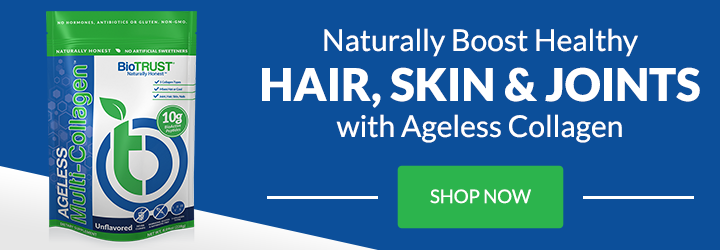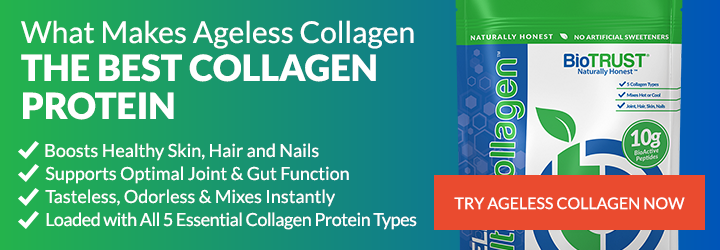7 Signs You Are Suffering from a Collagen Deficiency

By now we all understand how important protein is for maintaining a healthy lifestyle. But what may be lesser known is the different types of protein our bodies benefit from, specifically when it comes to collagen protein.
Collagen is considered one of the most important proteins because it makes up to 30% of the protein in the body—and is the most abundant protein in the body. It’s so important that the word “collagen” is often accompanied by the phrase “fountain of youth.” This is because collagen can play a role in maintaining healthy skin, hair, digestion, bones, and joints along with many other parts of the body responsible for helping us look and feel younger and healthier. 1
As we age, our bodies gradually stop producing ideal amounts of collagen, causing us to become collagen deficient. In fact, the decrease in collagen production happens so gradually—beginning at around age 25—you may not even realize you are suffering from a collagen deficiency. Luckily, there are simple, easily identifiable signs.
Collagen is an animal-derived protein that has long been known to have a plethora of benefits. The use of collagen has been traced back hundreds of years to ancient Chinese cultures where it was originally made from donkey hides and transformed into drinks and soups. Today, collagen is much more easily obtainable and can be found in the form of bone broths, capsules, creams, and powders. But not all collagen supplements are the same. In fact, there are dozens of different types of collagen, each of which react differently in the body. 2
Keeping track of all the different types of collagen can get overwhelming and difficult to understand. Luckily, researchers have narrowed down which types are the most important for the body.
The 5 Most Important Types of Collagen Protein
Type I Collagen
Most of the collagen found in the body is composed of Type I collagen. This type of collagen can be found in the skin, bones, connective tissue, and blood vessels. 3 As a result, this type of collagen is most widely recognized for its anti-aging properties. And, deficiencies in Type I collagen are most recognizable by the appearance of sagging skin and wrinkles. 4
Type II Collagen
This type of collagen is recognized for supporting joint health. This is because Type II can be found in much of the elastic cartilage in the body. Additionally, Type II collagen is the most efficiently absorbed type of collagen. Research has found this type of collagen may also help those who experience arthritis pain. 5,6
Type III Collagen
Type III is the second most prevalent in the body as it provides structure for muscles, organs, and blood vessels. As such, Type III collagen supports healthy blood clotting as well as aids in muscle growth. 7 Deficiencies in Type III collagen have been thought to be associated with increased aortic distensibility as well as other heart complications. 8
Type V Collagen
This type of collagen is found in most intestinal tissue as well as in skin, hair, and the cornea of the eye. However, one of the most important places Type V can be found is in the placenta as it is essential for neonatal development. 11 Becoming deficient in Type V collagen is associated with a decline in eye health and decreased transparency in the cornea, which can impair vision. 12
Type X Collagen
Type X collagen is primarily found in cartilage. Type X collagen is thought to play a role in providing mineralization and structural support for articular cartilage. Further, it is essential to bone growth and is considered a good biomarker for new bone growth. 13,14

7 Signs of Collagen Deficiency
Unquestionably, we can all agree collagen is crucial to almost all parts of our bodies, and becoming deficient can wreak havoc on our health. Deficiencies often take time to develop and are associated with other underlying health complications and/or nutrient deficiencies.
So, what happens if you become deficient in collagen? Understanding the role of each type of collagen can provide some insight on what types of symptoms you could experience with a collagen deficiency, and thus, if you could benefit from increasing your collagen intake. Below are 7 signs you may be suffering from collagen deficiency.
1. Wrinkling & Premature Aging
Although developing wrinkles is a natural part of aging, the early appearance of wrinkles may be slowed through proper collagen supplementation. 15,16 This is because collagen is important in connective tissue, and when we are low in collagen, the thickness of the epidermis is reduced, and skin loses its elasticity, which leads to wrinkling. 17 Collagen also aids in increasing moisture retention, boosting elasticity, reducing the appearance of fine lines, and smoothing skin. 18
2. Joint Pain
As collagen levels decrease and our existing collagen begins to deteriorate in the body, we are more likely to suffer from stiff, swollen, and painful joints due to increased friction between our bones and ligaments. 19 Research shows collagen can support joint health, as well as reduce inflammation and arthritis. 20,21
3. Achy Muscles
A percentage of our muscle mass is made of collagen protein; however, as we age, muscle mass is often lost. 22 In addition, increased friction between ligaments and muscles due to the weakening of collagen fibers can cause achy muscles. Research has shown that collagen supplementation can help increase muscle mass. 23 In particular, one of the most burdensome muscle groups is our lower back muscles. Fortunately, studies have shown collagen may help ease these pains by helping support the spine.
4. Brittle Hair & Nails
Collagen protein contains the amino acid proline, one of the main components of keratin, which is needed for healthy hair and nails. 24 Studies have shown collagen supplementation can help harden nails and improve growth as well as reduce hair loss and slow graying. 25,26,27
5. Abnormal Blood Pressure
Collagen plays a role in blood flow as it creates the walls of blood vessels. However, as collagen deteriorates, regulation of blood flow may become more difficult. Typically, low levels of collagen are associated with abnormally low blood pressures. 28 Consequently, very low blood pressure can cause other negative symptoms such as headaches, fatigue, and dizziness.
6. Poor Gut Health & Leaky Gut
Collagen is a primary component of the cells in the gut lining. This is because collagen contains glycine and glutamine, which are two amino acids beneficial for promoting digestion and a healthy gut barrier. 29 As a result, the gut wall may be strengthened to stop toxins from entering the bloodstream from a leaky gut. Further, a healthy gut lining can improve digestion and nutrient absorption and reduce bloating. 30 Plus, as an added bonus, a healthy gut can lead to a better and stronger immune system.
7. Poor Appetite Control
Consuming collagen may help suppress appetite because it supports satiating hormones. 31 In addition, collagen has been found to help make you feel fuller for longer than other proteins such as whey or soy. 32 Having a more satisfied feeling of fullness can then reduce calorie intake to help support weight loss and maintenance of a leaner body. 33,34
How to Help Fight Back Against Collagen Deficiency
If you find yourself suffering from any of the signs of collagen deficiency above, you may want to consider adding more collagen protein into your diet. However, collagen protein can be more difficult to obtain from foods because it is different than other protein sources. And we typically don’t consume as much collagen as our ancestors who ate “nose to tail.” Bone broth is one common food option, but the easiest way to get enough collagen is through supplementation.
When choosing a collagen supplement, you want to make sure you are getting one with several different collagen types to reap all the amazing benefits it has to offer. Another important consideration to make when choosing a quality collagen supplement is whether or not it’s hydrolyzed. Hydrolyzed collagen is protein which has been made into smaller molecules, which makes it easier and faster for the body to absorb. 35
BioTRUST’s Ageless Multi-Collagen™ Protein contains five different types of hydrolyzed collagen protein from four different sources. Additionally, BioTRUST’s Ageless Multi-Collagen™ Protein has been tested to verify its purity, potency, and safety.
Not only can incorporating more collagen into your diet reduce your chance of developing a collagen deficiency, but it may aid in improving your health overall. So, even if you don’t yet suspect that you may be deficient in collagen, you can likely benefit in some way from a little extra collagen in your diet to support optimal health and wellness.







